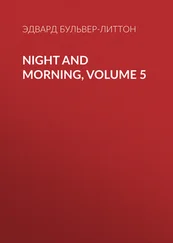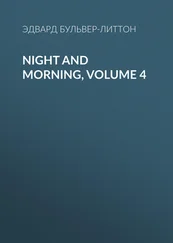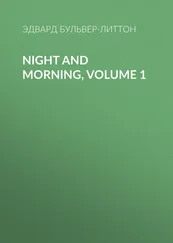Эдвард Бульвер-Литтон - Night and Morning, Complete
Здесь есть возможность читать онлайн «Эдвард Бульвер-Литтон - Night and Morning, Complete» — ознакомительный отрывок электронной книги совершенно бесплатно, а после прочтения отрывка купить полную версию. В некоторых случаях можно слушать аудио, скачать через торрент в формате fb2 и присутствует краткое содержание. Жанр: foreign_prose, literature_19, Европейская старинная литература, foreign_antique, на английском языке. Описание произведения, (предисловие) а так же отзывы посетителей доступны на портале библиотеки ЛибКат.
- Название:Night and Morning, Complete
- Автор:
- Жанр:
- Год:неизвестен
- ISBN:нет данных
- Рейтинг книги:3 / 5. Голосов: 1
-
Избранное:Добавить в избранное
- Отзывы:
-
Ваша оценка:
- 60
- 1
- 2
- 3
- 4
- 5
Night and Morning, Complete: краткое содержание, описание и аннотация
Предлагаем к чтению аннотацию, описание, краткое содержание или предисловие (зависит от того, что написал сам автор книги «Night and Morning, Complete»). Если вы не нашли необходимую информацию о книге — напишите в комментариях, мы постараемся отыскать её.
Night and Morning, Complete — читать онлайн ознакомительный отрывок
Ниже представлен текст книги, разбитый по страницам. Система сохранения места последней прочитанной страницы, позволяет с удобством читать онлайн бесплатно книгу «Night and Morning, Complete», без необходимости каждый раз заново искать на чём Вы остановились. Поставьте закладку, и сможете в любой момент перейти на страницу, на которой закончили чтение.
Интервал:
Закладка:
“What a fine-looking fellow my uncle is!” said Arthur, with involuntary admiration.
“Ay, an excellent life—amazingly strong!” returned the pale father, with a slight sigh.
“Philip,” said Mr. Beaufort, as they cantered across the paddock, “I think the gate is too much for you. I will just take Puppet over, and then we will open it for you.”
“Pooh, my dear father! you don’t know how I’m improved!” And slackening the rein, and touching the side of his horse, the young rider darted forward and cleared the gate, which was of no common height, with an ease that extorted a loud “bravo” from the proud father.
“Now, Puppet,” said Mr. Beaufort, spurring his own horse. The animal cantered towards the gate, and then suddenly turned round with an impatient and angry snort. “For shame, Puppet!—for shame, old boy!” said the sportsman, wheeling him again to the barrier. The horse shook his head, as if in remonstrance; but the spur vigorously applied showed him that his master would not listen to his mute reasonings. He bounded forward—made at the gate—struck his hoofs against the top bar—fell forward, and threw his rider head foremost on the road beyond. The horse rose instantly—not so the master. The son dismounted, alarmed and terrified. His father was speechless! and blood gushed from the mouth and nostrils, as the head drooped heavily on the boy’s breast. The bystanders had witnessed the fall—they crowded to the spot—they took the fallen man from the weak arms of the son—the head groom examined him with the eye of one who had picked up science from his experience in such casualties.
“Speak, brother!—where are you hurt?” exclaimed Robert Beaufort.
“He will never speak more!” said the groom, bursting into tears. “His neck is broken!”
“Send for the nearest surgeon,” cried Mr. Robert. “Good God! boy! don’t mount that devilish horse!”
But Arthur had already leaped on the unhappy steed, which had been the cause of this appalling affliction. “Which way?”
“Straight on to –, only two miles—every one knows Mr. Powis’s house. God bless you!” said the groom. Arthur vanished.
“Lift him carefully, and take him to the house,” said Mr. Robert. “My poor brother! my dear brother!”
He was interrupted by a cry, a single shrill, heartbreaking cry; and Philip fell senseless to the ground.
No one heeded him at that hour—no one heeded the fatherless BASTARD. “Gently, gently,” said Mr. Robert, as he followed the servants and their load. And he then muttered to himself, and his sallow cheek grew bright, and his breath came short: “He has made no will—he never made a will.”
CHAPTER V
“Constance. O boy, then where art thou?
* * * * What becomes of me”
It was three days after the death of Philip Beaufort—for the surgeon arrived only to confirm the judgment of the groom: in the drawing-room of the cottage, the windows closed, lay the body, in its coffin, the lid not yet nailed down. There, prostrate on the floor, tearless, speechless, was the miserable Catherine; poor Sidney, too young to comprehend all his loss, sobbing at her side; while Philip apart, seated beside the coffin, gazed abstractedly on that cold rigid face which had never known one frown for his boyish follies.
In another room, that had been appropriated to the late owner, called his study, sat Robert Beaufort. Everything in this room spoke of the deceased. Partially separated from the rest of the house, it communicated by a winding staircase with a chamber above, to which Philip had been wont to betake himself whenever he returned late, and over-exhilarated, from some rural feast crowning a hard day’s hunt. Above a quaint, old-fashioned bureau of Dutch workmanship (which Philip had picked up at a sale in the earlier years of his marriage) was a portrait of Catherine taken in the bloom of her youth. On a peg on the door that led to the staircase, still hung his rough driving coat. The window commanded the view of the paddock in which the worn-out hunter or the unbroken colt grazed at will. Around the walls of the “study”—(a strange misnomer!)—hung prints of celebrated fox-hunts and renowned steeple-chases: guns, fishing-rods, and foxes’ brushes, ranged with a sportsman’s neatness, supplied the place of books. On the mantelpiece lay a cigar-case, a well-worn volume on the Veterinary Art, and the last number of the Sporting Magazine. And in the room—thus witnessing of the hardy, masculine, rural life, that had passed away—sallow, stooping, town-worn, sat, I say, Robert Beaufort, the heir-at-law,—alone: for the very day of the death he had remanded his son home with the letter that announced to his wife the change in their fortunes, and directed her to send his lawyer post-haste to the house of death. The bureau, and the drawers, and the boxes which contained the papers of the deceased were open; their contents had been ransacked; no certificate of the private marriage, no hint of such an event; not a paper found to signify the last wishes of the rich dead man.
He had died, and made no sign. Mr. Robert Beaufort’s countenance was still and composed.
A knock at the door was heard; the lawyer entered.
“Sir, the undertakers are here, and Mr. Greaves has ordered the bells to be rung: at three o’clock he will read the service.”
“I am obliged to you., Blackwell, for taking these melancholy offices on yourself. My poor brother!—it is so sudden! But the funeral, you say, ought to take place to-day?”
“The weather is so warm,” said the lawyer, wiping his forehead. As he spoke, the death-bell was heard.
There was a pause.
“It would have been a terrible shock to Mrs. Morton if she had been his wife,” observed Mr. Blackwell. “But I suppose persons of that kind have very little feeling. I must say that it was fortunate for the family that the event happened before Mr. Beaufort was wheedled into so improper a marriage.”
“It was fortunate, Blackwell. Have you ordered the post-horses? I shall start immediately after the funeral.”
“What is to be done with the cottage, sir?”
“You may advertise it for sale.”
“And Mrs. Morton and the boys?” “Hum! we will consider. She was a tradesman’s daughter. I think I ought to provide for her suitably, eh?”
“It is more than the world could expect from you, sir; it is very different from a wife.”
“Oh, very!—very much so, indeed! Just ring for a lighted candle, we will seal up these boxes. And—I think I could take a sandwich. Poor Philip!”
The funeral was over; the dead shovelled away. What a strange thing it does seem, that that very form which we prized so charily, for which we prayed the winds to be gentle, which we lapped from the cold in our arms, from whose footstep we would have removed a stone, should be suddenly thrust out of sight—an abomination that the earth must not look upon—a despicable loathsomeness, to be concealed and to be forgotten! And this same composition of bone and muscle that was yesterday so strong—which men respected, and women loved, and children clung to—to-day so lamentably powerless, unable to defend or protect those who lay nearest to its heart; its riches wrested from it, its wishes spat upon, its influence expiring with its last sigh! A breath from its lips making all that mighty difference between what it was and what it is!
The post-horses were at the door as the funeral procession returned to the house.
Mr. Robert Beaufort bowed slightly to Mrs. Morton, and said, with his pocket-handkerchief still before his eyes:
“I will write to you in a few days, ma’am; you will find that I shall not forget you. The cottage will be sold; but we sha’n’t hurry you. Good-bye, ma’am; good-bye, my boys;” and he patted his nephews on the head.
Читать дальшеИнтервал:
Закладка:
Похожие книги на «Night and Morning, Complete»
Представляем Вашему вниманию похожие книги на «Night and Morning, Complete» списком для выбора. Мы отобрали схожую по названию и смыслу литературу в надежде предоставить читателям больше вариантов отыскать новые, интересные, ещё непрочитанные произведения.
Обсуждение, отзывы о книге «Night and Morning, Complete» и просто собственные мнения читателей. Оставьте ваши комментарии, напишите, что Вы думаете о произведении, его смысле или главных героях. Укажите что конкретно понравилось, а что нет, и почему Вы так считаете.












